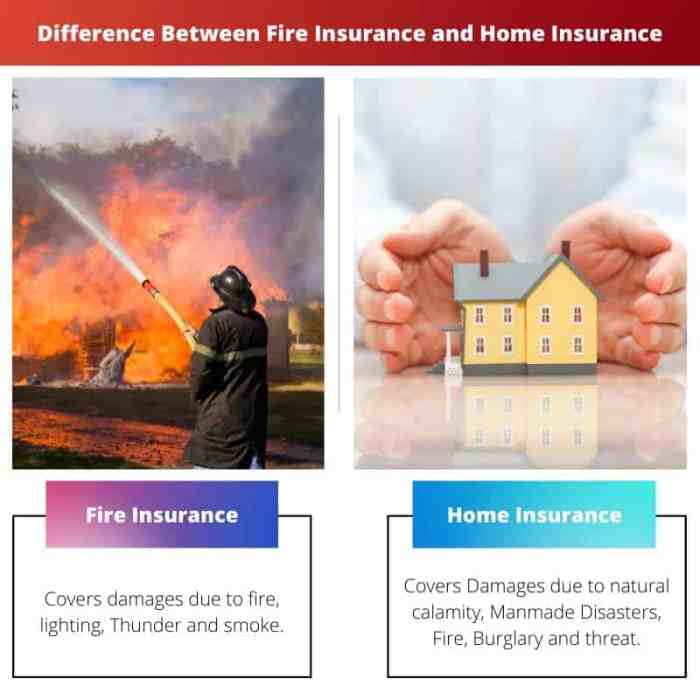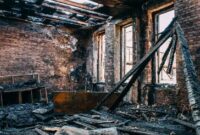Delving into Does homeowners insurance cover fire damage?, this introduction immerses readers in a unique and compelling narrative, with semrush author style that is both engaging and thought-provoking from the very first sentence.
Understanding the nuances of homeowners insurance coverage when it comes to fire damage is crucial for every homeowner. This guide will explore the ins and outs of what is typically covered, how claims are processed, and important considerations to keep in mind.
Homeowners Insurance Coverage: Does Homeowners Insurance Cover Fire Damage?
When it comes to homeowners insurance, understanding what is covered in your policy is crucial. Typically, homeowners insurance provides coverage for damage to your home and personal belongings caused by specific perils, such as fire, theft, or vandalism.
Types of Coverage Included in a Standard Policy, Does homeowners insurance cover fire damage?
- Dwelling Coverage: This type of coverage helps repair or rebuild your home if it is damaged or destroyed by a covered peril, such as a fire.
- Personal Property Coverage: This coverage helps replace or repair your personal belongings, like furniture or clothing, if they are damaged or destroyed by a covered peril.
- Liability Coverage: This coverage can protect you financially if someone is injured on your property and sues you for damages.
- Additional Living Expenses Coverage: If your home becomes uninhabitable due to a covered loss, this coverage helps pay for temporary living expenses, such as hotel bills or meals.
It is important to review your policy details and understand your coverage limits to ensure you have adequate protection in case of a fire or other disaster.
Fire Damage Coverage

When it comes to homeowners insurance, coverage for fire damage is a crucial component that provides financial protection in the event of a fire-related disaster. Understanding what types of fire damage are typically covered, how coverage is structured in a policy, as well as any exclusions or limitations is essential for homeowners to make informed decisions.
Types of Fire Damage Covered
- Structural Damage: Homeowners insurance typically covers the cost of repairing or rebuilding your home if it is damaged by fire.
- Personal Property Damage: Belongings such as furniture, clothing, and electronics that are damaged or destroyed in a fire are usually covered by homeowners insurance.
- Additional Living Expenses: If your home is uninhabitable due to fire damage, homeowners insurance may cover the cost of temporary housing and living expenses.
Coverage Structure in a Policy
- Fire damage coverage is usually included in a standard homeowners insurance policy as part of the dwelling coverage.
- Most policies have a coverage limit for fire damage, which may be based on a percentage of the dwelling coverage limit.
- Additional coverage options, such as extended replacement cost coverage, may be available to increase the coverage limit for fire damage.
Exclusions and Limitations
- Intentional Acts: Damage caused by intentionally setting a fire is typically not covered by homeowners insurance.
- Vacant Homes: If a fire occurs in a vacant home, coverage may be limited or excluded depending on the policy terms.
- Wildfires: Some insurance policies may have limitations or exclusions for damage caused by wildfires, requiring additional coverage or endorsements.
Additional Living Expenses

In the event of fire damage to your home, homeowners insurance may provide coverage for additional living expenses (ALE). This coverage helps pay for costs associated with temporarily living away from your home while it is being repaired or rebuilt.
How Additional Living Expenses Coverage Works
- ALE coverage typically includes expenses such as hotel stays, temporary rentals, meals, and other necessary living expenses.
- Insurance companies may have limits on the amount of coverage for ALE, so it’s important to review your policy to understand the extent of coverage available.
- Keep receipts and documentation for all expenses related to ALE, as insurance companies will require proof of these costs for reimbursement.
Examples of Covered Expenses
- Hotel stays or temporary rentals
- Meals and groceries that exceed your normal expenses
- Transportation costs to and from your temporary living arrangements
- Storage costs for your belongings while you are displaced
Importance of Keeping Receipts and Documentation
- Having detailed records of your additional living expenses will make the reimbursement process smoother and ensure you receive the full coverage you are entitled to.
- Documenting all expenses will also help you stay within the limits of your policy coverage and avoid unexpected out-of-pocket costs.
Rebuilding and Repair Costs

When a homeowner experiences fire damage to their property, the costs of rebuilding and repair can be overwhelming. Fortunately, homeowners insurance can help alleviate some of the financial burden associated with these expenses.
Filing a claim for rebuilding and repair costs typically involves documenting the extent of the damage, obtaining estimates from contractors, and providing this information to your insurance company. It’s essential to act quickly and efficiently to ensure a smooth claims process.
How Homeowners Insurance Helps
- Homeowners insurance typically covers the cost of rebuilding and repair after a fire, up to the limits specified in your policy.
- Insurance companies may send adjusters to assess the damage and determine the amount covered under your policy.
- Additional living expenses incurred while your home is being repaired, such as temporary housing and meals, may also be covered.
Filing a Claim for Rebuilding and Repair Expenses
- Document the damage with photographs and videos, and keep records of all communications with contractors and your insurance company.
- Obtain estimates from licensed contractors for the cost of repairs and provide these to your insurance company.
- Review your policy to understand the coverage limits and any deductibles that may apply to the claim.
Tips for Ensuring a Smooth Claims Process
- Notify your insurance company as soon as possible after the fire to start the claims process promptly.
- Work with reputable contractors who have experience dealing with insurance claims to ensure accurate estimates and quality repairs.
- Keep detailed records of all expenses related to the fire damage, including receipts for temporary housing and meals.
In conclusion, navigating the complexities of homeowners insurance coverage for fire damage requires attention to detail and proactive planning. By understanding your policy, documenting expenses, and following the correct procedures, you can ensure a smoother claims process and faster recovery in the event of a fire.
When it comes to renting a property, many tenants wonder, is renters insurance necessary for tenants ? While it’s not mandatory, renters insurance can provide valuable protection for personal belongings and liability coverage. In case of unexpected events like theft or fire, having renters insurance can offer peace of mind and financial security.
For homeowners looking for additional coverage beyond their basic policy, umbrella insurance for additional home coverage may be the solution. This type of insurance provides extra liability protection that goes beyond the limits of standard policies, offering peace of mind for unforeseen circumstances. It can be a wise choice for those seeking comprehensive coverage.
Understanding the basic homeowners insurance coverage explained is essential for every homeowner. This type of insurance typically includes coverage for the structure of the home, personal belongings, liability protection, and additional living expenses in case of a covered loss. Knowing what your policy covers can help you make informed decisions and ensure adequate protection for your home.




